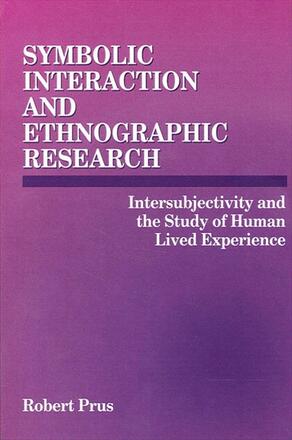
Symbolic Interaction and Ethnographic Research
Intersubjectivity and the Study of Human Lived Experience
Alternative formats available from:
Examines a series of theoretical and methodological issues faced by social scientists in interpretive and ethnographic studies of human group life.
Description
At the heart of the sociological enterprise is the idea that human behavior is the product of community life; that people's behaviors cannot be reduced to individual properties. A major task facing sociologists ( and social scientists more generally), revolves around the study of the accomplishment of intersubjectivity; that is, indicating how people become social entities and how they attend to one another and the products of human endeavor on a day-to-day basis.
Taking issue with both positivist and postmodernist orientations to the social sciences, the approach taken here insists that the theory and methods of the social sciences respect "the actualities of human group life. " The objective is to establish a greater (epistemological) coherence between the theory, methods, and research which typifies the social sciences, and the actual, ongoing practices and experiences of those who constitute the human community. This necessitates a radical reorientation of our images of science generally, but most particularly of the "scientific method" as this pertains to the study of the human condition.
Focusing on the "doing" of everyday life, this volume examines a series of theoretical and methodological issues entailed in an interpretive/ethnographic study of human group life. The ideas developed here deal with the historical roots, assumptions, variants, concepts and literature characterizing an interpretive/ethnographic approach to the study of human behavior and examine many of the major issues and obstacles facing those embarking on the study of human lived experience.
Robert Prus is Professor of Sociology at the University of Waterloo. He has also written Hookers, Rounders, and Desk Clerks: The Social Organization of the Hotel Community; Pursuing Customers: An Ethnography of Marketing Activities; Making Sales: Influence as Interpersonal Accomplishment; Road Hustler: Grifters, Magic, and the Their Subculture; and Doing Everyday Life: Ethnography as Human Lived Experience.
Reviews
"I think that this book could become the single, most definitive dissenting statement about postmodern ethnography. An erudite treatise of the epistemological underpinnings and practical realities of ethnographic research, it provides a timely, thoughtful, and provocative treatment of major debates about doing ethnographic research and social science inquiry. It does not simply make another contribution to the literature, it represents the author's mature reflections that can only come through deep involvement in the issues throughout an entire career. In this way, the book is a culminating piece of work that pulls together and explicates crucial debates about the nature, significance, and representation of ethnographic research. Prus' work is a crowning intellectual accomplishment. " — Kathy Charmaz, Sonoma State University